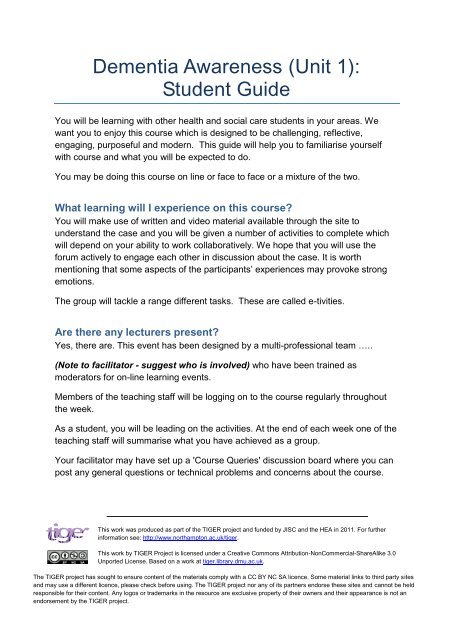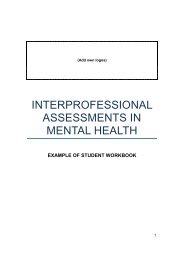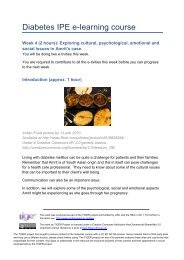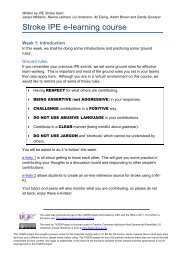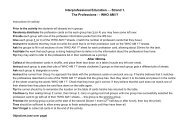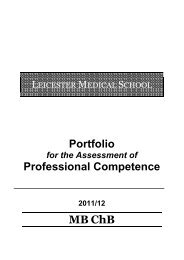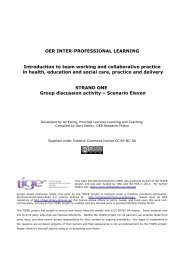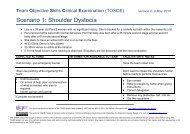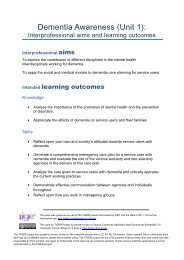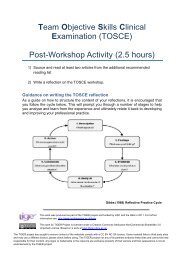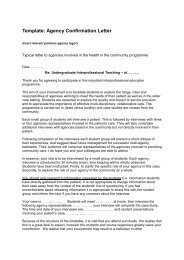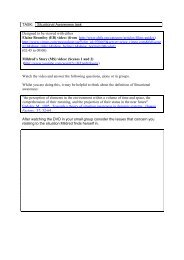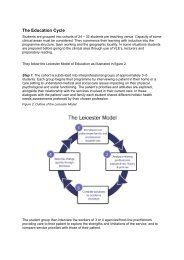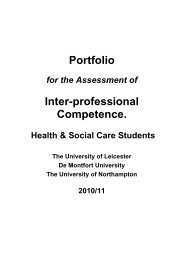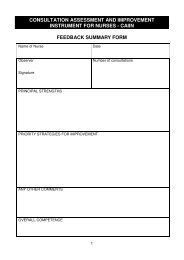Dementia Awareness (Unit 1) - Student Guide.pdf
Dementia Awareness (Unit 1) - Student Guide.pdf
Dementia Awareness (Unit 1) - Student Guide.pdf
You also want an ePaper? Increase the reach of your titles
YUMPU automatically turns print PDFs into web optimized ePapers that Google loves.
Your virtual learning environment (VLE) should have an ‘announcements’ section.From time to time we will post messages via this section to inform you of any courserelated issues.Will I be assessed?Detailed guidelines for any formal written assessments or portfolios will be given toyou by your own module leaders.For this course, you must engage with all the e-tivities and contributions Thelearning builds on from one unit to the next. You will be formatively assessed on thecontributions you make over the course. Feedback will be given by your e-tutors.Conversely, if you do not engage with the activities, the tutors will invite you tocontribute, remind you of the rules of engagement and even email you personally ifnecessary.At the end of the event you are required to complete two written tasks. These are anaccount of the learning and a reflection on the skills you have developed towardsgaining an interprofessional competence fit for practice in the modern health andsocial care professions. Details will be provided to you. The work can be transferredinto your IPE portfolio.You will be able to use the contributions that you make to discussions each week inyour final week reflective pieces. You will receive more guidance by your tutor:two or three important problems that have arisen in team working from thiscoursesuggested solutions with reflections on how your practice may change as aresult.How much do I have to contribute?For each task every member of the group will have to contribute at least one originalposting to the group and at least one considered response to someone else'sposting. This is the minimum ‘attendance’ necessary to gain credit for this event inyour IPE portfolio. However, we hope that you will feel enthused to make severalcontributions to each discussion and to interact with all of the other group members.This work was produced as part of the TIGER project and funded by JISC and the HEA in 2011. For furtherinformation see: http://www.northampton.ac.uk/tiger.This work by TIGER Project is licensed under a Creative Commons Attribution-NonCommercial-ShareAlike 3.0Unported License. Based on a work at tiger.library.dmu.ac.uk.The TIGER project has sought to ensure content of the materials comply with a CC BY NC SA licence. Some material links to third party sitesand may use a different licence, please check before using. The TIGER project nor any of its partners endorse these sites and cannot be heldresponsible for their content. Any logos or trademarks in the resource are exclusive property of their owners and their appearance is not anendorsement by the TIGER project.
You will be expected to complete your postings within the week they are set and youwill not be able to move on to the next week’s activities until the start of that week.This is to keep everyone at broadly the same level of involvement.Don’t wait until the end of each week to make your contribution as this places anunequal burden on other group members. Try to make sure that you are contributingregularly.How much time should I spend on this?We estimate that you should spend around two hours per week. You can do morebut we suggest not more than four hours per week. Different people will work atdifferent speeds with this format and will have different knowledge of thebackground. We suggest that a productive way to use the site is to make severalshorter visits e.g. 20-30 minutes each spread out through the week. Obviously youare free to go on-line at whatever time of the day or night suits you best.Interprofessional (IP) Competencies : a reminderCompetency is the ability to handle a complex professional situation by thecombining of (Miller, 1990):* Knowledge ~ the learning of specific fact* Skills ~ the practice of knowledge* Attitudes ~ the development of appropriate values demonstrated throughprofessional behaviourInterprofessional competence relates to your ability to become an effective memberof a multidisciplinary team. It consists of some of the following elements:The ability to place patients/service users/clients centrally in your workThe appreciation of the roles and responsibilities of multi-disciplinary teammembersEffective communicationThe ability to manage team conflict issuesThe building and sustaining of mature team-working relationshipsThe development of mutual respect and value for team membersThis work was produced as part of the TIGER project and funded by JISC and the HEA in 2011. For furtherinformation see: http://www.northampton.ac.uk/tiger.This work by TIGER Project is licensed under a Creative Commons Attribution-NonCommercial-ShareAlike 3.0Unported License. Based on a work at tiger.library.dmu.ac.uk.The TIGER project has sought to ensure content of the materials comply with a CC BY NC SA licence. Some material links to third party sitesand may use a different licence, please check before using. The TIGER project nor any of its partners endorse these sites and cannot be heldresponsible for their content. Any logos or trademarks in the resource are exclusive property of their owners and their appearance is not anendorsement by the TIGER project.
ReferenceMiller GE. (1990) The assessment of clinical skills/competence/performance.Academic Medicine, 65 (9): S63-S67Discussion Boards, Blogs and WikisIn relation to discussion boards there is a separate basic guide to posting, readingand responding to messages which you can find in the first e-tivity.If you want to know how to use a WIKI, watch thishttp://www.commoncraft.com/video-wikis-plain-englishIf you want to know how to use a BLOG, watch thishttp://www.commoncraft.com/blogsYou will need a set of headphones to listen to the commentary.Quick Tips:Blackboard - When inside the discussion board itself the screen can appear quiteuntidy, however, there are 3 buttons on the right hand-side of the 'thread' box whichenables you to customise the views. These are an arrow pointing downwards tominimise and maximise window buttons.Web Browser - to make the discussion board even more clear click F11 once toactivate full screen viewDiscussion boards / Forums - When replying to other peoples messages in thediscussion board remember you can change the title of your message. This can beuseful when there are a number of replies starting with "RE:RE:RE:RE:RE:RE:" etc.If you remove these RE:it makes the board more readable.The overall aims and learning outcomes for <strong>Dementia</strong> IPE activities:a reminderTo promote a positive attitude towards the challenges of working with service userswith dementiaOn completion of all 13 <strong>Unit</strong>s, the following can be achieved:This work was produced as part of the TIGER project and funded by JISC and the HEA in 2011. For furtherinformation see: http://www.northampton.ac.uk/tiger.This work by TIGER Project is licensed under a Creative Commons Attribution-NonCommercial-ShareAlike 3.0Unported License. Based on a work at tiger.library.dmu.ac.uk.The TIGER project has sought to ensure content of the materials comply with a CC BY NC SA licence. Some material links to third party sitesand may use a different licence, please check before using. The TIGER project nor any of its partners endorse these sites and cannot be heldresponsible for their content. Any logos or trademarks in the resource are exclusive property of their owners and their appearance is not anendorsement by the TIGER project.
KnowledgeAnalyse the importance of the promotion of mental health and the preventionof disorders.Appreciate the effects of dementia on service users and their familiesSkillsReflect upon your own and society’s attitudes towards service users withdementiaGenerate a comprehensive interagency care plan for a service user withdementia and evaluate the role of the various statutory and non-statutoryagencies in the delivery of this care planAnalyse the care given to service users with dementia and critically appraisethe current working practicesDemonstrate effective communication between agencies and individualsthroughoutReflect upon how you work in interagency groups.AttitudesValue the importance of involving service users with dementia and theircarer’s in the generation of care plans and in identifying unmet physical,psychological and social needsBe aware of the need to tolerate uncertainty in clinical practice and be morereceptive about the views of othersTo recognise and challenge discriminatory practice towards service users withdementiaDevelop a positive attitude towards the challenges of working with serviceusers with dementiaWhen you have looked over the information you can commence the course.This work was produced as part of the TIGER project and funded by JISC and the HEA in 2011. For furtherinformation see: http://www.northampton.ac.uk/tiger.This work by TIGER Project is licensed under a Creative Commons Attribution-NonCommercial-ShareAlike 3.0Unported License. Based on a work at tiger.library.dmu.ac.uk.The TIGER project has sought to ensure content of the materials comply with a CC BY NC SA licence. Some material links to third party sitesand may use a different licence, please check before using. The TIGER project nor any of its partners endorse these sites and cannot be heldresponsible for their content. Any logos or trademarks in the resource are exclusive property of their owners and their appearance is not anendorsement by the TIGER project.


